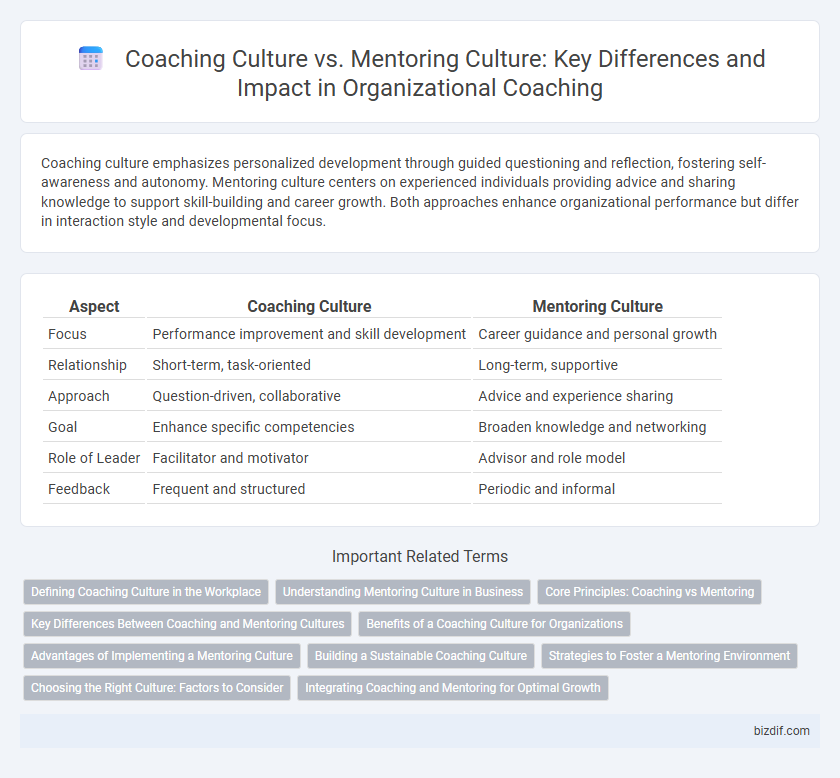Coaching culture emphasizes personalized development through guided questioning and reflection, fostering self-awareness and autonomy. Mentoring culture centers on experienced individuals providing advice and sharing knowledge to support skill-building and career growth. Both approaches enhance organizational performance but differ in interaction style and developmental focus.
Table of Comparison
| Aspect | Coaching Culture | Mentoring Culture |
|---|---|---|
| Focus | Performance improvement and skill development | Career guidance and personal growth |
| Relationship | Short-term, task-oriented | Long-term, supportive |
| Approach | Question-driven, collaborative | Advice and experience sharing |
| Goal | Enhance specific competencies | Broaden knowledge and networking |
| Role of Leader | Facilitator and motivator | Advisor and role model |
| Feedback | Frequent and structured | Periodic and informal |
Defining Coaching Culture in the Workplace
A coaching culture in the workplace emphasizes continuous learning, empowerment, and open communication, fostering employee growth through regular feedback and skill development. Unlike mentoring culture that centers on guidance from senior to junior staff, coaching culture encourages peers and leaders at all levels to facilitate self-discovery and performance improvement. Organizations with a coaching culture experience higher engagement, adaptability, and sustained personal and professional development.
Understanding Mentoring Culture in Business
Mentoring culture in business emphasizes experienced professionals guiding less experienced employees through knowledge sharing and personal development. This culture fosters long-term relationships, trust, and continuous learning, enhancing employee retention and organizational growth. Unlike coaching culture, mentoring often involves a more holistic approach, addressing career goals and personal growth beyond immediate performance improvements.
Core Principles: Coaching vs Mentoring
Coaching culture emphasizes empowering individuals through asking powerful questions, fostering self-discovery, and enhancing performance by unlocking potential. Mentoring culture centers on sharing wisdom, providing guidance based on experience, and supporting personal and professional growth through direct advice. Core principles of coaching prioritize facilitation and autonomy, while mentoring focuses on knowledge transfer and relationship-building.
Key Differences Between Coaching and Mentoring Cultures
Coaching culture emphasizes performance improvement, skill development, and goal-oriented feedback, fostering a structured and results-driven environment. Mentoring culture prioritizes personal growth, wisdom sharing, and long-term relationship-building, creating a supportive and developmental atmosphere. Organizations with coaching cultures typically implement formal processes and regular assessments, whereas mentoring cultures rely on informal, experience-based guidance and emotional support.
Benefits of a Coaching Culture for Organizations
A coaching culture in organizations fosters continuous learning, enhances employee engagement, and drives sustainable performance improvement. Unlike traditional mentoring cultures that emphasize hierarchical guidance, a coaching culture promotes open communication and empowers individuals at all levels to develop problem-solving skills. This shift leads to increased innovation, higher retention rates, and a resilient workforce adaptable to change.
Advantages of Implementing a Mentoring Culture
Implementing a mentoring culture fosters long-term professional growth by pairing experienced mentors with mentees, enhancing knowledge transfer and skill development across the organization. This approach promotes deeper interpersonal relationships and personalized guidance, leading to increased employee engagement and retention. Companies with a mentoring culture often experience accelerated leadership development and a more cohesive, supportive work environment.
Building a Sustainable Coaching Culture
Building a sustainable coaching culture involves embedding continuous learning and feedback mechanisms across all organizational levels to enhance employee development and performance. Unlike mentoring culture, which relies on one-on-one guidance typically from senior to junior staff, coaching culture fosters a collaborative environment where leaders and peers actively engage in developing skills and self-reflection. Prioritizing scalable coaching practices and leadership commitment creates an adaptive workforce equipped to meet evolving business challenges.
Strategies to Foster a Mentoring Environment
Fostering a mentoring environment requires implementing strategies that prioritize relationship-building, trust, and knowledge sharing within an organization. Establishing structured programs that pair experienced mentors with mentees, complemented by regular feedback and goal-setting sessions, enhances skill development and professional growth. Encouraging a culture of open communication and recognizing mentorship contributions drives sustained engagement and promotes continuous learning.
Choosing the Right Culture: Factors to Consider
Choosing the right culture hinges on organizational goals, workforce needs, and development style; a coaching culture emphasizes continuous feedback, empowerment, and skill-building, while a mentoring culture focuses on long-term guidance, knowledge transfer, and relationship development. Factors such as employee readiness, leadership support, and desired outcomes like innovation or retention influence the decision. Evaluating the maturity of internal talent and aligning culture with strategic objectives ensures maximum impact on performance and engagement.
Integrating Coaching and Mentoring for Optimal Growth
Integrating coaching and mentoring cultures fosters a dynamic environment where personalized growth meets experiential guidance, enhancing leadership development and employee engagement. Coaching culture prioritizes goal-oriented, performance-driven dialogue, while mentoring culture emphasizes long-term career development and knowledge transfer. Combining these approaches creates a holistic framework that drives continuous learning, skill enhancement, and organizational agility.
Coaching culture vs mentoring culture Infographic

 bizdif.com
bizdif.com